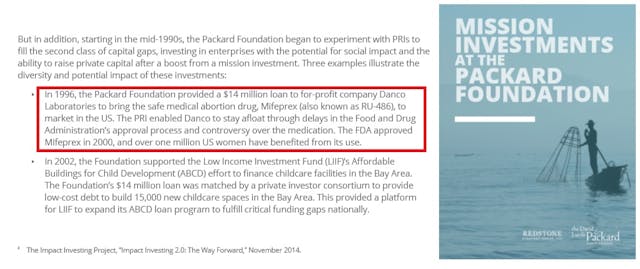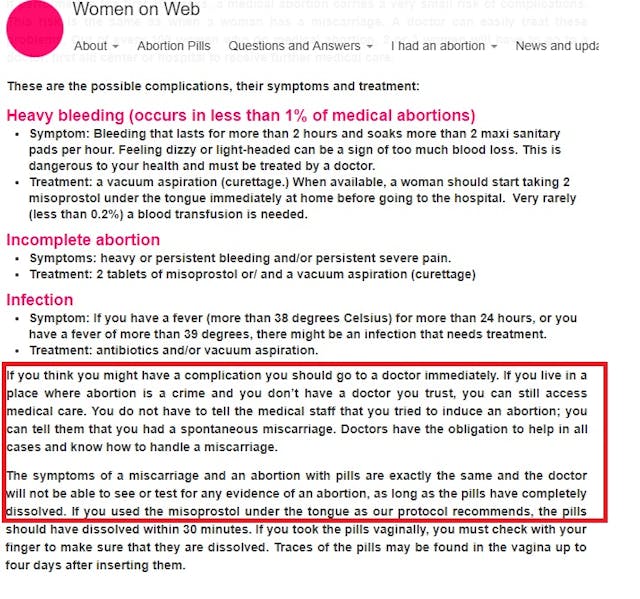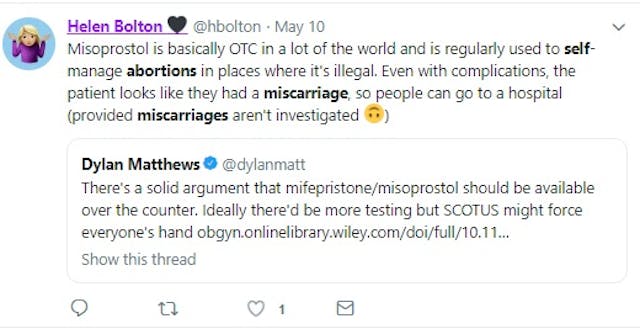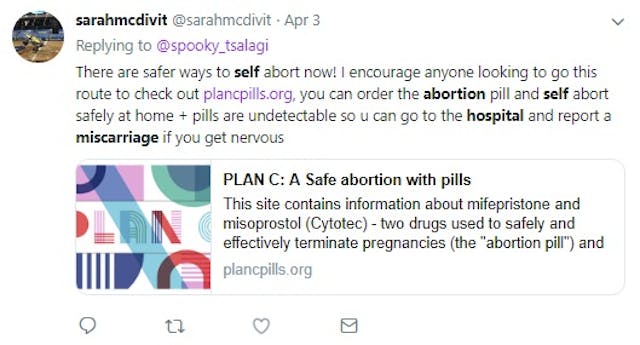
She instantly regretted taking the abortion pill. Then one pro-life sign changed everything
Andrea Trudden
·
Abortion Pill·By Carole Novielli
AWFUL: Abortion groups tell women to lie about abortion pill, claim miscarriage
Just as abortion supporters rage over new pro-life laws in Georgia and Alabama, claiming that women could be investigated for miscarriages, comes proof that abortion supporters are actually advising women who experience complications from illegal use of the abortion pill to lie to health care providers and say they had miscarriages.
Currently, abortion insiders, many with ties to abortion pill manufacturer Danco, are pushing for expansion of the abortion pill, despite thousands of adverse effects and two dozen deaths. The abortion pill regimen consists of two drugs: Mifepristone (or Mifeprex) and Misoprostol. The FDA has warned women against purchasing these dangerous pills online.
Dr. Daniel Grossman, a professor of obstetrics and gynecology at the University of California, San Francisco, who also teaches abortion allegedly told a reporter at The Atlantic that if women using these [self-managed abortion] regimens experience heavy bleeding or some other complication, they are generally advised to go to a hospital and say they had a miscarriage.
Grossman is behind clinical trials to expand the abortion pill for pharmacy dispension and is calling to remove important safety requirements put in place by the FDA, called REMS. This comes as no surprise, as one of the major original investors of abortion pill manufacturer Danco — The Packard Foundation — has funded other Grossman-authored studies. In other words, those behind the studies attempting to do away with FDA safety requirements for the abortion pill stand to gain a significant amount of money if those requirements are removed.

The international abortion organization, Women on Web, advises women on its website to present to the ER and claim they are having a miscarriage if they experience complications from the abortion pill in a country where taking the drug is illegal:
If you think you might have a complication you should go to a doctor immediately. If you live in a place where abortion is a crime and you don’t have a doctor you trust, you can still access medical care. You do not have to tell the medical staff that you tried to induce an abortion; you can tell them that you had a spontaneous miscarriage. Doctors have the obligation to help in all cases and know how to handle a miscarriage.
The symptoms of a miscarriage and an abortion with pills are exactly the same and the doctor will not be able to see or test for any evidence of an abortion, as long as the pills have completely dissolved.

According to a report from The Atlantic, Women on Web’s founder, Rebecca Gomperts, launched the site Aid Access to sell the abortion pill online, against FDA requirements. The FDA recently issued Aid Access a warning letter to cease its illegal activity. Last week, over 100 lawmakers sent a letter to the FDA, asking it to continue to monitor and crack down on dangerous websites like Aid Access.
But that has not stopped other proponents of self-managed abortion, who seem set on placing women in harm’s way. The website Plan C, founded in 2015 by Francine Coeytaux and Elisa Wells, tells women, “Those who choose to self-manage their abortion have no obligation to report that they have used misoprostol and there is no way it can be detected in the body, even if a blood test is taken. Scientists have found that there is no noticeable difference between a naturally occurring miscarriage and the bleeding that happens after taking misoprostol.”

Then, if something goes wrong (and it most likely will), the Plan C website, which is under the fiscal sponsorship of the National Women’s Health Network, advises women to present to the emergency room or other health care offices and simply claim they are experiencing a miscarriage.

Live Action News previously reported how abortion organization, Reproaction, purchased over $4,000 in ads to promote a push for self-managed abortion — something unapproved by the FDA. Reproaction also advises women to seek care by lying about their abortions.
Article continues below
Dear Reader,
In 2026, Live Action is heading straight where the battle is fiercest: college campuses.
We have a bold initiative to establish 100 Live Action campus chapters within the next year, and your partnership will make it a success!
Your support today will help train and equip young leaders, bring Live Action’s educational content into academic environments, host on-campus events and debates, and empower students to challenge the pro-abortion status quo with truth and compassion.
Invest in pro-life grassroots outreach and cultural formation with your DOUBLED year-end gift!
A webinar published in 2018 states in part that women “need information to reduce the risk of arrest… what the signs of a complication are and most importantly what to say if one needs to go to the doctor…. [T]he symptoms of an abortion with pills and miscarriage are exactly the same and the treatment for any kind of complication is exactly the same…. It’s important for people to understand there’s no test for these pills in blood or urine so if they present with a miscarriage they can get the healthcare that they need….”

A tweet from “Helen Bolton” — whose profile implies that he or she is with organized abortion groups “@ReproRights and @TheDoulaProject” — reiterates the deception being proposed: “Misoprostol is basically OTC in a lot of the world and is regularly used to self-manage abortions in places where it’s illegal. Even with complications, the patient looks like they had a miscarriage, so people can go to a hospital (provided miscarriages aren’t investigated).”

Others have made similar suggestions.

FDA warns women: “Do Not Buy Mifeprex Over the Internet.”

The FDA adds, “You should not buy Mifeprex over the Internet because you will bypass important safeguards designed to protect your health (and the health of others). Mifeprex has special safety restrictions on how it is distributed to the public. Also, drugs purchased from foreign Internet sources are not the FDA-approved versions of the drugs, and they are not subject to FDA-regulated manufacturing controls or FDA inspection of manufacturing facilities.”
According to the FDA’s adverse effects reports through 2018, there have been reports of 24 deaths associated with Mifeprex since the product was approved in September 2000, as well as 4,200 reported adverse effects, including hospitalization and other serious complications.
Editor’s Note, 4/18/21: The FDA has received reports of serious adverse events in women who took Mifeprex. As of December 31, 2018, there were reports of 24 deaths of women associated with Mifeprex since the product was approved in September 2000, including two cases of ectopic pregnancy resulting in death; and several cases of severe systemic infection (also called sepsis), including some that were fatal.
The adverse events cannot with certainty be causally attributed to mifepristone because of concurrent use of other drugs, other medical or surgical treatments, co-existing medical conditions, and information gaps about patient health status and clinical management of the patient. A summary report of adverse events that reflects data through December 31, 2018 is here.
“Like” Live Action News on Facebook for more pro-life news and commentary!
Live Action News is pro-life news and commentary from a pro-life perspective.
Contact editor@liveaction.org for questions, corrections, or if you are seeking permission to reprint any Live Action News content.
Guest Articles: To submit a guest article to Live Action News, email editor@liveaction.org with an attached Word document of 800-1000 words. Please also attach any photos relevant to your submission if applicable. If your submission is accepted for publication, you will be notified within three weeks. Guest articles are not compensated (see our Open License Agreement). Thank you for your interest in Live Action News!

Andrea Trudden
·
Human Interest
Andrea Trudden
·
Abortion Pill
Carole Novielli
·
Abortion Pill
Carole Novielli
·
Abortion Pill
Carole Novielli
·
Abortion Pill
Bridget Sielicki
·
Abortion Pill
Carole Novielli
·
Abortion Pill
Carole Novielli
·
Investigative
Carole Novielli
·
Abortion Pill
Carole Novielli
·
Investigative
Carole Novielli
·